Dressed in a tailored suit and travelling only by chauffeur-driven limousines, Alick Kapikanya looked every inch the successful businessman.
He lived in mansions in some of the most exclusives postcodes in leafy Cheshire, stayed in suites at five-star hotels and enjoyed a life many of us could only dream of.
But beneath the glitz and glamour is not the story of a self-made man or go-getting entrepreneur.
Kapikanya is in fact a fraudster who spun a web of lies stretching back decades, racking up 11 convictions including theft.
And despite five deportation orders, the conman dodged being kicked out of Britain for an astonishing 27 years.
But his crimes, which included stealing elderly victims’ homes in an elaborate £3.5million mortgage scam, have finally caught up with him as the Appeal Court definitively ruled at the end of last month that he be deported.
After 42 years in the UK, Kapikanya is to be sent back to his native Zambia.
Now, as he stands defeated, the Daily Mail can reveal the luxury addresses at which he had lived while splashing his ill-gotten gains.

Deportation: Alick Kapikanya, who lived the high life after being part of a gang who stole identities to fraudulently take ownership of their homes, remortgage them and pocket the cash
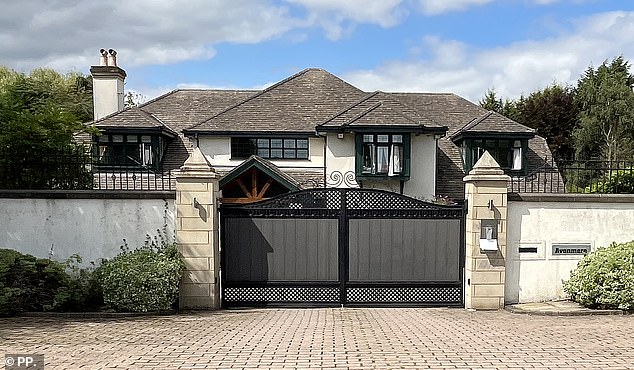
Pictured: A riverside mansion in an exclusive part of leafy Cheshire owned by conman Kapikanya between 2006 and 2007
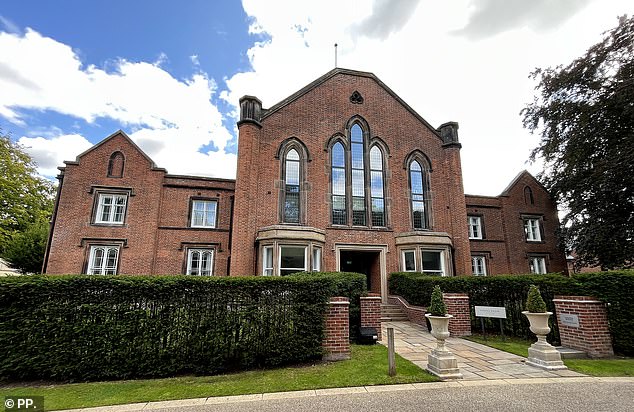
Kapikanya, who changed his name to Alex May by deed poll, was recently registered as living at a flat in the luxury Chapel House in the suburb of Didsbury
Among his property portfolio was a gated mansion he owned between 2006 and 2007, on the sought-after Mereside Road, in Cheshire, where properties average £2.3million.
Known as the area’s millionaires’ row, it lies in the desirable Knutsford town which forms part of Cheshire’s ‘Golden Triangle’.
The area is popular among footballers and celebrities, and is home to the likes of England stars Jordan Pickford and John Stones.
The impressive mansion is protected by tall gates and backs on to The Mere river.
When the Daily Mail visited the address, a neighbour who said she remembered Kapikanya commented, ‘Not a bit surprised to be honest. And plenty more like him around here.’
Meanwhile, in 2021, Kapikanya was registered as having lived at a luxury flat at Chapel House, in the exclusive St James Park area, close to the posh suburb of Didsbury in Manchester.
The conman changed his name to Alex May by deed poll after returning from jail, and had the same Didsbury residence registered as a company address under this name between 2023 and 2025.
Residents at the flats told of how he had seemed ‘normal’.
One neighbour said: ‘He lived here a few years ago. I remember him coming and going.
‘He seemed very normal, nothing out of the ordinary.’
But this was far from the case. Kapikanya’s flamboyant lifestyle was not contained to just his fancy residences.
He used the money, pocketed from conducting identity theft and remortgaging victims’ homes, on lavish stays at West End hotels and gambling sessions at The Ritz Hotel Casino in Mayfair, and would travel only by limousine.
And despite his convictions, he was a high-flying member of society.
He would meet up with councillors to discuss the regeneration of Grimsby, and was in talks to take over Notts County FC and become a majority shareholder in Grimsby Town FC, though they ultimately fell through and led to the resignation of a deputy council leader.
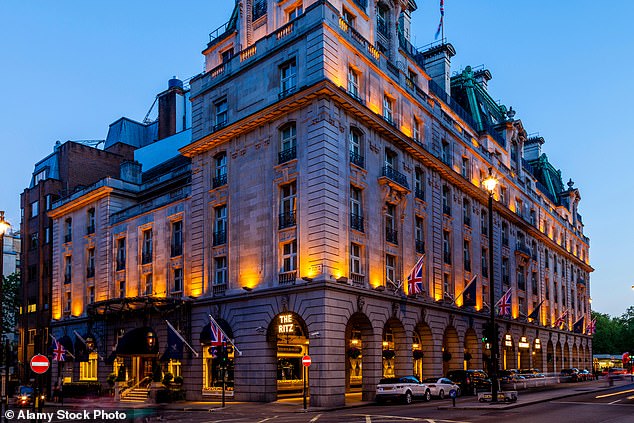
Pictured: The Ritz Hotel, in Mayfair. Kapikanya is said to have gambled away thousands of pounds of his ill-gotten gains in the Ritz Club casino in the hotel’s basement
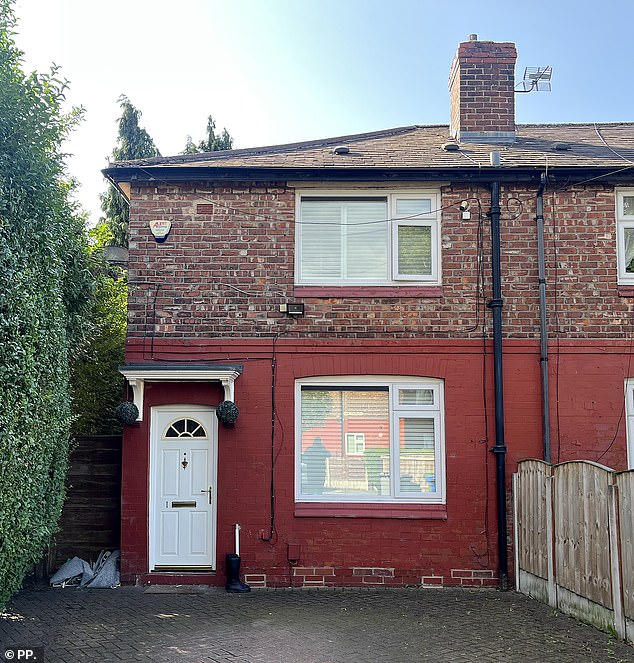
The 57-year-old convicted fraudster is understood to have previously lived at this address in Stretford, Manchester. It vastly differs from the lavish properties he was previously in
The 57-year-old first arrived in the UK aged 14 to be adopted, but was reportedly ‘assimilated into a religious cult’ when it fell through. Not long after, he fell into a life of crime.
He was first warned he could be removed from Britain in 1992 after he was convicted of his first crime – attempted fraud and theft.
Then in 1996 he was convicted of two offences of theft and was sentenced to 21 months’ imprisonment. He was also convicted of theft of a motor vehicle and sentenced to a consecutive term of 15 months’ imprisonment.
It was following this, in 1998, that Kapikanya was first notified he was ‘liable to deportation’ because of his offending. In March 2000, after serving his sentence, he lost an appeal against deportation, but no order to remove him from the country was made.
The conman was then further convicted of dishonesty in 2008 and again notified of his liability to deportation. In February 2010, notice of a decision to deport him was served.
On 12 March 2013, then Home Secretary Theresa May made a decision to deport him but he successfully appealed and was granted leave to remain until 15 April 2016.
Undeterred, he then picked up from where he left off and launched fresh scams.
In 2014, Kapikanya and a property fraudster nicknamed ‘Mr Fastcash’ were found guilty of having led a housing crime gang who stole luxury homes across the country and illegally used them to obtain loans.
The gang worked by stealing elderly people’s identities to take ownership of properties, remortgage them and pocket the cash.
A total of ten homes were targeted in the £3.5m scam.
Four were targeted in Worsley, Greater Manchester, one each in the villages of Hale and Malpas, Cheshire, and three properties owned by a couple in Sleaford, Lincolnshire.
Kapikanya had helped to recruit the team of conmen including a crooked conveyancing agent to acquire the title deeds of houses then use fake passports, driving licences and utility bills to pose as the real homeowners.
The gang would go to solicitors’ offices throughout Britain using the fake documents to sign over the properties to property tycoon ‘Mr Fastcash’ – real name Marshall Joseph – so he could take out loans with a number of financial institutions and secure mortgages against the ‘stolen’ homes.
The victims, the true owners of the ten homes involved, knew nothing about the illegal loans secured on their homes until police uncovered the scam after the gang defaulted on secured loan repayments.
The group, who had successfully gained £3.5m from their fraud and were about to obtain an addition £3.3m, were jailed in 2014 after the case was heard at Manchester Crown Court. Kapikanya sentenced to six years.
The offences had been committed between 2007 and 2008.
It was the eleventh time Kapikanya had been convicted of a crime in this country.
At the time of his arrest, he is understood to have lived at an address on Chatsworth Road, Stretford, Manchester. The semi-detached dwelling is on the more modest side of his property portfolio.
When the Daily Mail visited this address, a neighbour said: ‘Yes I remember him. I used to see him and coming and going. He would let on the odd time.
‘Just very normal. No flash cars or anything.
‘I am shocked to hear about the fraud.’
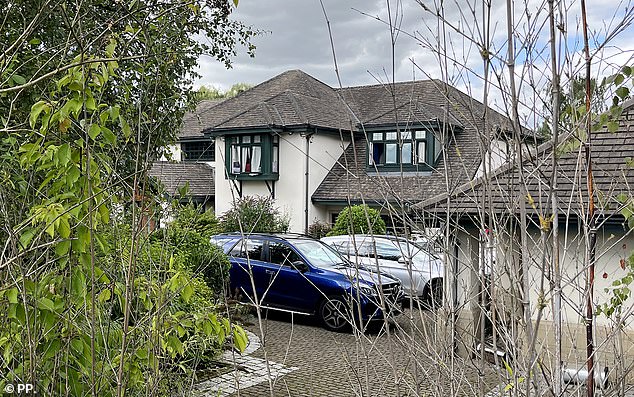
Kapikanya had been living at this Cheshire mansion between 2006 and 2007. The offences he was convicted for in 2014 were in relation to offences committed in 2007 and 2008
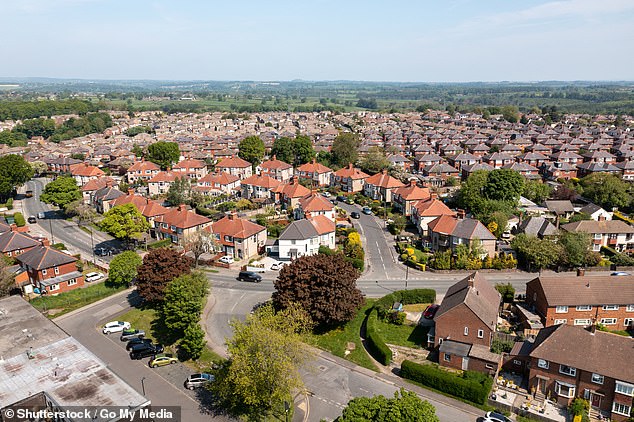
Kapikanya’s gang stole the identities of elderly people in Manchester, Cheshire and Lincolnshire
But while his victims’ lives were turned upside down, having to fight to reclaim legal ownership of their own houses, Kapikanya, had been splashing the ‘stolen’ cash on a luxury lifestyle.
This included gambling away £170,000 in a single night.
He owed £100,000 for the hire of luxury cars, and arranged for the transfer of £60,000 into a casino account he held at the Ritz. He used the money to pocket £82,000 on the roulette wheels only to gamble away £8,000 later.
Yet another deportation order was made on 3 February 2016 following the 2014 convictions – but he challenged it via the Court of Appeal and his case was returned to a First-Tier Tribunal (FTT).
It took another seven years, until January 2023, for the case to be heard at the FTT – 25 years after he was first notified of his liability to deportation – and Kapikanya was allowed to remain based on the ‘unduly harsh and very compelling’ impact on his son, who was 17 at the time.
He was also heard to have had a wife he had married in the time after the 2016 deportation decision.
During this time between the 2016 order and the appeal being heard in the FTT, the conman, who had changed his name to Alex May, tried to broker a deal to takeover Notts County FC, acting as an ‘advisor’, however the bid collapsed.
He was then later also exposed for having links with the ex-deputy leader of North East Lincolnshire and Grimsby Town FC majority shareholder John Fenty.
Grimsby Live pictured Kapikanya, or May, sitting with Grimsby Town directors during a League Two game against Mansfield.
The convicted fraudster was also found to have set up a company with Mr Fenty, with the revelations prompting the deputy council leader to resign from his position.
Following the FTT decision, the Home Office took the case to the Upper Tier tribunal in April 2023 and successfully challenged the decision, leading Kapikanya to go to the Court of Appeal.
And at the Court of Appeal ruling late last month, the fraudster was finally ordered to be deported by Appeal Court judges Lord Justice Bean, Lord Justice Peter Jackson and Lord Justice Baker.
They wrote: ‘[Kapikanya] has been the subject of five decisions that he should be deported over a period of a quarter of a century.
‘The system of appeals and orders for reconsideration has served him well in enabling him to remain in the UK throughout that period.’
In the latest hearing, the Appeal Court heard he came to the UK in April 1983, aged 14, to be adopted. The adoption fell through and, the court heard, Kapikanya was ‘assimilated into a religious cult’.
Now married with a 20-year-old son, at an earlier appeal hearing Kapikanya argued he was in remission from stomach cancer and was suffering from anxiety. He was described as being ‘socially and culturally integrated into the United Kingdom’ with ‘no familial or social links with Zambia’.
Barrister Zane Malik KC argued deportation would be ‘unduly harsh’ on Kapikanya’s son. Mr Malik added ‘over and above’ that the fact Kapikanya has lived in the UK for 42 years also constituted ‘very compelling circumstances’.
But the panel of judges said Home Secretary Yvette Cooper ‘should now, at last, be allowed to put the November 2016 deportation order into effect.’
Describing the impact of the property fraud at the time Kapikanya was sentenced, Ben Southam, senior crown prosecutor, said: ‘The mortgages and loans were obtained against houses they did not own, and without the knowledge of the real homeowners.’
The true owners ‘knew nothing about the loans’ and were caused ‘considerable distress and inconvenience’, he added.












